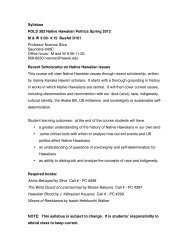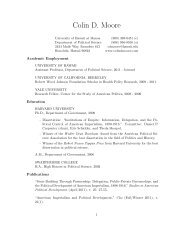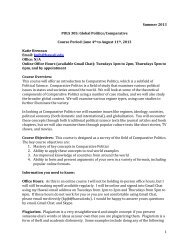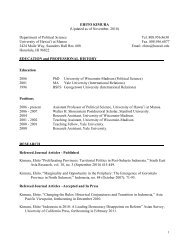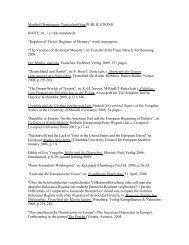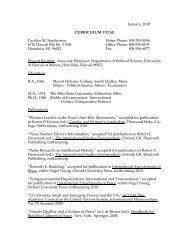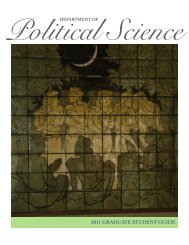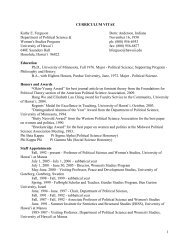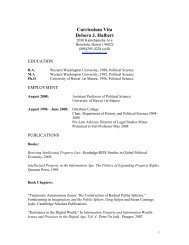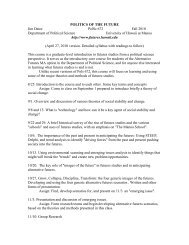Spring 2013 POLS 673 Syllabus - Department of Political Science
Spring 2013 POLS 673 Syllabus - Department of Political Science
Spring 2013 POLS 673 Syllabus - Department of Political Science
You also want an ePaper? Increase the reach of your titles
YUMPU automatically turns print PDFs into web optimized ePapers that Google loves.
Governance Architectures <strong>of</strong> the U-Society<br />
<strong>Spring</strong> <strong>2013</strong><br />
Pols <strong>673</strong> Jim Dator, John Sweeney<br />
Arch 693, Hyoung-June Park<br />
The advent <strong>of</strong> ubiquitous, interactive, embedded electronic communication technologies<br />
portend significant socio-political and architectural changes, some <strong>of</strong> which may or may<br />
not be preferred. From smart dust to smart cities, information networks are radically<br />
altering how people interact with faces, races, places, and spaces. As the aegis <strong>of</strong> big data<br />
beckons, it is still unclear how these technological advancements might impact<br />
governance, even as many governments today begin to implement these platforms with<br />
scant concern for their impacts. There is still time to shape the futures <strong>of</strong> democratic<br />
forms <strong>of</strong> governance in a high-tech society.<br />
This joint studio-based seminar explores possibilities and potentialities for preferred<br />
governance within a so-called "Ubiquitous Society" (U-Society) based on the theories<br />
and methods <strong>of</strong> political futures studies, especially anticipatory governance design,<br />
aligned with computer-based architectural modeling, primarily digital prototyping.<br />
Course participants will register either for Pols <strong>673</strong> or Arch 693, but will work together in<br />
teams to propose overall U-Governance designs for a transformational future in 2035,<br />
and render computer models that will demonstrate basic structural dynamic relations and<br />
human interactions.<br />
Weeks 1-2: Introduction to <strong>Political</strong> Futures Design and Performance-oriented<br />
Architecture<br />
The first two weeks <strong>of</strong> the semester explores theories and methods in political futures<br />
studies alongside critical issues concerning technology, economics, culture, and the<br />
environment. The concept <strong>of</strong> the "Anthropocene Epoch" will be discussed, and the basic<br />
contours <strong>of</strong> a high tech transformation society--based on "The Singularity"--will be<br />
developed<br />
<strong>Political</strong> Futures Studies<br />
Dator, "Futures studies"<br />
Dator, "On society as an invention and you as a social inventor"<br />
Dator, "Trend analysis vs. Emerging issues analysis"<br />
Dator, "Next Generations: Reactives to Civics to Adaptives.<br />
The Anthropocene Epoch<br />
Dator, "Assuming 'responsibility for your rose'"<br />
Steffen, The Anthropocene: Are Humans Now Overwhelming the Great Forces <strong>of</strong><br />
Nature?<br />
The Singularity<br />
Chalmers, "The Singularity"
2 <br />
Dator and Seo, "Korea as the wave <strong>of</strong> a future: The emerging Dream Society <strong>of</strong><br />
Icons and Aesthetic Experience"<br />
Dahlin, "Our posthuman futures and education: Homo Zappiens, Cyborgs, and the<br />
New Adam"<br />
Dunagan, "Neur<strong>of</strong>utures"<br />
Performance-based Architecture<br />
Theories and applications <strong>of</strong> interactive design in architecture<br />
Rhinoceros 3D and Grasshopper Setting<br />
Weeks 3-5: Futures and Governance Design<br />
Evolution <strong>of</strong> governance structures--influence <strong>of</strong> cosmology, technology, and choice.<br />
Understanding that (and how) "structures matters". The idea <strong>of</strong> a "U-Society"<br />
How Structure Matters<br />
Riggs, "Constitutional reform: Some guidelines"<br />
Dator, "Structure Matters"<br />
Dator, "Governing the Futures: Dream or Survival Societies"<br />
Dahl, "Framed Up"<br />
Klarreich, "Election selection:<br />
Mackenzie, "Best man lose"<br />
Governance by Architecture<br />
Katyal, "Architecture as crime control"<br />
Zahm, "Design against crime"<br />
Amedeo, et al., Three assumptions <strong>of</strong> "Person-Environment-Behavior Research"<br />
Beaver, "Nature and Nurture <strong>of</strong> antisocial behavior<br />
Ubiquitous Governance<br />
Bullinga, "Intelligence Government"<br />
Mannermaa, Living in the European Ubiquitous Society"<br />
Dator, "Ubiquitous Dream, Transformational and other Futures<br />
Greenfield, "Everyware"<br />
Dunagan, "Designer governance"<br />
Paige, "Nonkilling governance"<br />
Design Concept & Strategy<br />
Learning Rhinoceros 3D and Grasshopper with various interactive design<br />
examples<br />
Developing Design Concept & Strategies<br />
Week 6: Critical images <strong>of</strong> a U-Society<br />
Issues <strong>of</strong> power, control, agency, participation, privacy, rights, resistance<br />
Deleuze, "Postcript on societies <strong>of</strong> control"<br />
Cheney-Lippold, "A new algorithmic identity"<br />
Sweeney, "Catastrophe and progress in nonkilling futures"
3 <br />
MacKenzie, "Power"<br />
Design Concept & Strategy<br />
Learning Rhinoceros 3D and Grasshopper with various interactive design examples<br />
Developing Design Concept & Strategies<br />
Week 7: Design scenarios and team engagement<br />
The scenario that each group will use as a baseline for their governance designs will be<br />
presented and discussed. Teams will engage in experiential exercises, charting metrics<br />
for their design solutions.<br />
Weeks-8-12: Finalizing governance designs<br />
Each week, teams will identify a specific portion <strong>of</strong> their design to articulate and test via<br />
verbal and visual concepts, and computer s<strong>of</strong>tware.<br />
Week 13 and 14: Preparing for the final presentation<br />
Teams will present the drafts <strong>of</strong> their designs and interactive programs<br />
Week 15: Final presentation <strong>of</strong> team governance designs<br />
Final presentations via computer and poster boards.<br />
When you finish Pols <strong>673</strong> successfully, you will understand:<br />
--What futures studies is and is not;<br />
--The four generic alternative futures;<br />
--The difference between predicting, forecasting and inventing the futures;<br />
--How to envision and design preferred futures and systems <strong>of</strong> governance;<br />
--That society is a social invention and that you should become a social inventor,<br />
especially <strong>of</strong> systems <strong>of</strong> governance;<br />
--That "structure matters" and how it matters in terms <strong>of</strong> governance design;<br />
--How to analyze and model social, cultural, and aesthetic dimensions <strong>of</strong> a<br />
“Ubiquitous Society” ( U-society);<br />
--How electronic information technologies and architectural structures<br />
might be used to create "U-governance";<br />
--Initial concepts and aspects <strong>of</strong> using Rhinoceros 3D and Grasshopper Setting to<br />
create dynamic computer models <strong>of</strong> structures <strong>of</strong> U-governance<br />
When you finish Arch 693 successfully, you will understand:<br />
Interdisciplinary Connections<br />
--Ability to connect appropriate and deep and wide-ranging interdisciplinary knowledge<br />
with Futures Studies;
4 <br />
--Ability to incorporate deep and wide ranging interdisciplinary knowledge and factors<br />
into research or design project<br />
Design Methodology<br />
--Ability to self-consciously select and apply an effective team-based design method to a<br />
moderately complex problem regarding the design <strong>of</strong> an interactive system with U-<br />
governance<br />
Technology<br />
--Ability to use state <strong>of</strong> the art computer aided design and communication tools to evolve<br />
a complex design related U-City and U-governance<br />
Student Performance Criteria<br />
A.3. Visual Communication Skills<br />
A.5. Investigative Skills<br />
A.6. Fundamental Design Skills



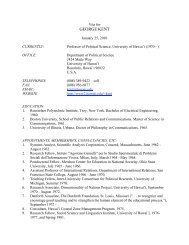
![Fall 2012 POLS 620 Syllabus [PDF] - Department of Political Science](https://img.yumpu.com/25416938/1/190x245/fall-2012-pols-620-syllabus-pdf-department-of-political-science.jpg?quality=85)
